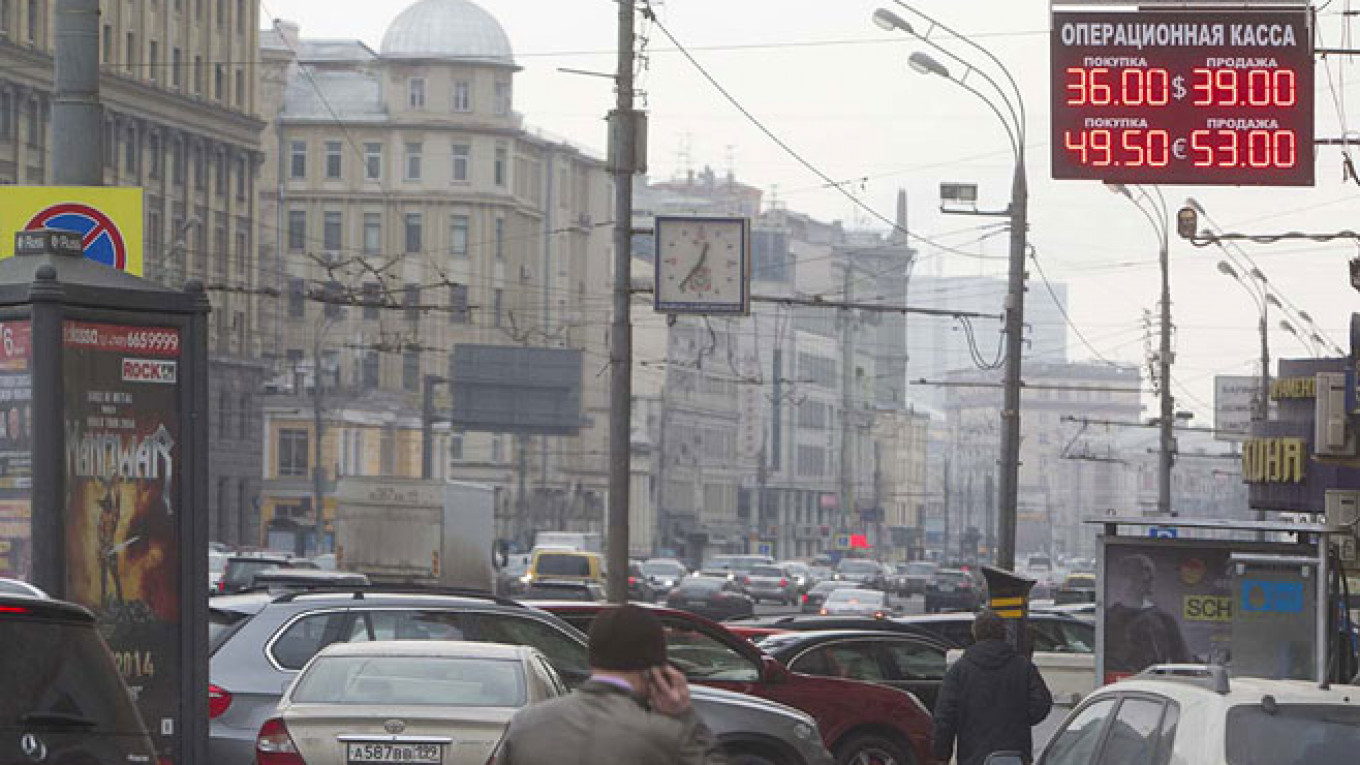The ruble and equity market plummeted Monday morning following escalation in the Crimean crisis over the weekend, as rattled investors withdrew their capital en masse and latched onto the most ironclad assets they could find.
President Vladimir Putin on Saturday received authorization from the Federation Council to move Russian military forces into Ukraine "until the situation in the country is normalized," sparking fears of outright war and threats of economic sanctions from the West.
The ruble-denominated MICEX index lost $58.4 billion in market capitalization since the end of trading Friday, the worst sell-off since the crisis of 2008, Reuters reported.
The ruble fell to historically low levels in the morning, trading at 37 to the dollar and 50.7 to the euro and breaching the upper bounds of the 42.2 ruble corridor against the basket set by the Central Bank.
Anticipating instability, the Central Bank unexpectedly raised its key lending rate in the morning from 5.5 to 7 percent, and propped up the ruble by selling dollars.
"There have been some $11 billion sold today, some $10 billion came from the Central Bank," said Mikhail Paley, a dealer at VTB Capital. The Central Bank still holds $493.4 billion in gold and foreign exchange reserves.
The increased lending rates will boost the cost of financing in rubles, which should in turn make the ruble more attractive for currency traders and ultimately stabilize the exchange rate, said HSBC chief economist Alexander Morozov, Vedomosti reported.
Other analysts doubted that the rate hike can prevent a further decline.
"If the situation does not improve in the next few days we should expect a further fall in the national currency, as raising rates does not have a long-term effect," said Mikhail Kuzmin, an analyst at Investcafe.
A jump to 37.0 against the dollar is plausible, Credit Suisse said in an e-mailed note, adding "we expect sizable outflows to continue through mid-2014."
As the exchange rate slid, Russians across the country raced to trade in their rubles for hard currencies, exhausting supplies at some banks.
"There are no dollars and euros, and there will not be any tomorrow," a representative from BKF bank in Novosibirsk told RIA Novosti.
In Tomsk, currency exchange offices were selling dollars at a rate of up to 42 rubles a dollar and euros at up to 60.1 rubles.
Global stock markets also fell, as investors pulled out of developing markets and pushed their funds into the safest assets they could think of, among them gold, German debt and the Japanese yen, Reuters reported.
Both the ruble-denominated MICEX exchange and the dollar-denominated RTS index began to plummet after they opened. By 8 p.m. Moscow time, the MICEX was down 10.8 percent and the RTS had tumbled 12 percent.
Shares in state-run VTB bank, the country's second-largest lender, were down 18 percent, while No. 1 Sberbank lost 15 percent of its share value.
Coal miner and steelmaker Mechel temporarily halted trading after its stock price fell 27.6 percent.
State-run oil giant Gazprom also saw its share price tumble 13.5 percent, though the company struck a positive note in its annual meeting with investors in London on Monday, predicting that European dependence on Russian gas would only rise, Reuters reported.
Deputy Economic Development Minister Andrei Klepach said Monday that he expects the "hysteria" on the markets to abate, but that he does not know when this will happen.
"What lies ahead of us is a period of more confrontation and difficulties. For us, that will mean more complicated relations with the European Union, the U.S., with all the resulting consequences," Klepach said.
Contact the author at [email protected]
A Message from The Moscow Times:
Dear readers,
We are facing unprecedented challenges. Russia's Prosecutor General's Office has designated The Moscow Times as an "undesirable" organization, criminalizing our work and putting our staff at risk of prosecution. This follows our earlier unjust labeling as a "foreign agent."
These actions are direct attempts to silence independent journalism in Russia. The authorities claim our work "discredits the decisions of the Russian leadership." We see things differently: we strive to provide accurate, unbiased reporting on Russia.
We, the journalists of The Moscow Times, refuse to be silenced. But to continue our work, we need your help.
Your support, no matter how small, makes a world of difference. If you can, please support us monthly starting from just $2. It's quick to set up, and every contribution makes a significant impact.
By supporting The Moscow Times, you're defending open, independent journalism in the face of repression. Thank you for standing with us.
Remind me later.


